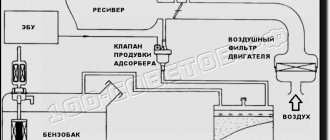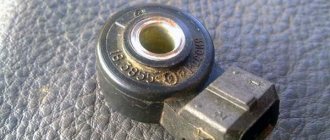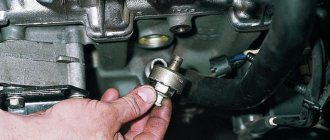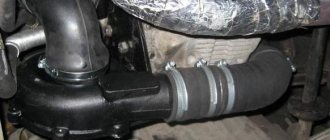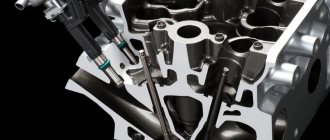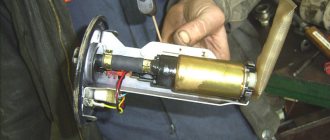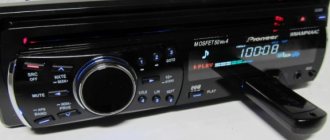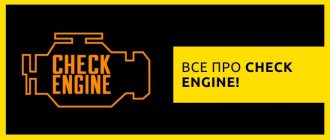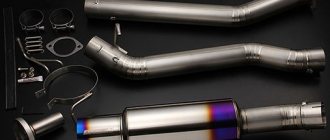Let's start with the fact that experienced auto mechanics and drivers themselves can identify a number of engine malfunctions by the sound of the internal combustion engine. As a rule, the appearance of a “ringing” when you sharply press the gas in high gears or a “rumbling” sound after turning off the ignition does not frighten novice car enthusiasts much, but it is often the sound of engine detonation.
Moreover, in some cases, such sounds are completely attributed to the knocking of piston pins. However, it is important to understand that often the problem is not in the fingers, but in detonation, which can soon result in serious troubles and expensive engine repairs.
It should be taken into account that piston pins usually knock on heavily worn engines that have long had problems with pistons, rings, etc. At the same time, loud tapping sounds in a relatively “fresh” power unit with a normal CPG are in no way the sounds of metal hitting metal.
In this case, a metallic ringing appears as a result of a disruption in the fuel combustion process in the cylinders. Next we will talk about the reasons why engine detonation occurs at idle, when the gas pedal is sharply pressed while driving, etc. We will also consider what the driver should do to maintain the service life and the internal combustion engine itself in good condition.
The concept of detonation, how it occurs
It happens that the ignition of the air-fuel mixture occurs before the glow plug, located directly in the cylinder, ensures proper ignition at low air temperatures. This phenomenon, which is accompanied by strong combustion of diesel fuel, is called diesel engine detonation.
Recommendations from experienced motorists
In the manufacture of automobile engines, all parts have certain parameters designed for operation in nominal temperature conditions. When an engine detonates, the vehicle is subjected to shock loads that exceed permissible values. Uneven distribution of fuel and oxygen masses leads to unexpected strong explosions.
To identify and prevent cases of detonation, it is recommended to listen to the uniformity of the sounds of the running engine. If unusual tapping or noise is detected, you must stop and turn off the engine. Next, you need to determine the source of the unknown sounds and try to eliminate it.
To avoid devastating consequences, detonation must be constantly monitored. The main thing to remember is that during normal operation there should not be even slight changes in the sound of the motor.
How to eliminate detonation in a diesel engine
Before eliminating detonation, it is important to determine the cause of its occurrence. In the vast majority of cases, this is an incorrect ignition angle and a lean fuel-air mixture caused by poor-quality diesel fuel.
To eliminate detonation, you usually do the following:
- Operating the engine at higher speeds, when the fuel combustion time in combination with maximum pressure is noticeably reduced.
- Using an intercooler to cool the air before entering the cylinders.
- Using high-quality diesel fuel.
- Braking the power plant to advance the ignition timing.
Engine detonation: main symptoms
So, detonation is an uncontrolled chaotic process of fuel combustion, which is more like explosions in a cylinder. Moreover, these conditional explosions occur untimely (for example, on the compression stroke, when the piston is still moving upward). As a result, the shock wave and high pressure cause severe loads on the elements of the CPG and crankshaft, literally destroying the engine.
Detonation is determined not only by sound, but also by a number of other signs. First of all, the engine loses power when you press the gas, and the engine may also smoke a little when you sharply press the accelerator pedal with grayish-black smoke. Typically, severe detonation is accompanied by engine overheating; at idle and under load, the operation of the internal combustion engine can be extremely unstable, the speed jumps, etc.
Consequences of detonation
Order special equipment on our website: Special equipment rental in Russia
During detonation, the temperature in the combustion chamber rises to 3.5 thousand degrees. The pressure also increases rapidly, the load on the engine becomes critical. All this can end especially badly for modern engines made of aluminum alloy. The consequences of engine detonation can be as follows:
- overheating and breakdown of engine parts;
- loss of power;
- destruction of partitions in the piston rings;
- burnout of the gasket located under the cylinder block.
In difficult cases, there is a high risk of the crankshaft turning, which leads to rotation of the crankshaft in the opposite direction. Ultimately, this leads to the destruction of power plant components and the need for complex repairs.
What definitely cannot be the cause of detonation on the “injector”
Until now, it was believed that fuel detonation in an engine can be caused by three factors:
- Low quality of the fuel itself;
- Octane number too low;
- Incorrect ignition timing setting.
It is interesting that all of the above does not apply to injection engines. The advance angle is set automatically, and it is selected just for the octane number. Well, dirty fuel, which contains debris, will burn in the same way as any low-octane fuel. True, its use indirectly leads to clogging of the injectors, but this effect will not appear immediately. In general, all of the above points are not relevant.
An injector operating with a clogged fine filter
Back in the 50s, when studying engine detonation, the causes were found and voiced:
- Using fuel with a fixed octane number, you can increase the ignition timing to a strictly defined limit. Having passed it, detonation is usually observed;
- Let the advance angle be constant. We will gradually reduce the octane number. Then it will be possible to get detonation, having overcome a certain “quality threshold”. In general, low-octane gasoline is bad.
The design of injection engines has a knock sensor (DS) (read more about it here). The ECU unit, in turn, changes the advance angle by monitoring the signal from this sensor. A malfunction of the DD itself will also not be fatal - the processor, although not immediately, will reduce the advance angle to a minimum. The power will then decrease, but detonation will be eliminated.
When the DD sensor fails, the Check Engine light must turn on. Before replacing the sensor, it is better to follow the recommendation - the number of engine starts should be minimized. It’s just that, after switching on, the controller does not immediately understand what exactly has gone wrong. Better to play it safe.
What threatens the appearance of soot?
Using fuel with a large amount of harmful impurities leads to the formation of soot. This is an axiom. If we talk about the causes of detonation, we need to distinguish between two concepts - carbon deposits on the surface of the cylinder and deposits on the spark plug body.
Pistons and cylinder surfaces
There is always a layer of carbon deposits on the inner surface of the cylinders, and its amount is constantly changing . You can fill the car with low-quality fuel, and then let the engine run at low power. The total amount of carbon deposits will increase as a result, which will lead to an increase in the compression ratio and a deterioration in heat dissipation. In general, detonation may occur, but the problem is solved like this:
- The car is stopped, the ignition timing is reduced, and the engine is started again. Adjustment is made only on the distributor;
- There is no distributor on an injection engine, and the advance angle is regulated by the ECU. No operator intervention is required - all you need is a working knock sensor. But even with a damaged sensor, it will not be possible to cause detonation - the system will react to the presence of a malfunction instantly and correctly.
There was no mention of carbon deposits on the spark plug body. Its appearance really poses a danger - we are talking about “glow ignition”. This phenomenon is described in more detail below.
The root causes of the precedent
Having understood the peculiarities of the concept of “detonation” and its practical destructive effect on the functionality of the engine, it is worth moving on to the search for factors that provoke such a phenomenon. There are many factors as a result of which detonation can occur in an engine, although most of them are considered indirect and lead to negative consequences in a complex manner. The causes of engine detonation are identical for all types of power units, often as follows:
- Refueling with low octane fuel or poor quality fuel.
- Coking of the engine with combustion components.
- Operation of spark plugs that do not meet the requirements of the vehicle manufacturer.
- Failures in the process of mixture formation.
- Overheating of the power unit.
- Malfunction of the engine cooling system.
- Incorrect operation of the injectors or fuel pump.
What can detonation lead to?
- Sudden overheating of the engine;
- Reduced engine power;
- Increased fuel consumption;
- Failure of the cylinder-piston group;
- Corrosion of engine cylinders and pistons;
- Burnout of the cylinder head gasket;
- Piston cracks;
- Breakthrough of the BC head;
- Damage to the earbuds.
Troubleshooting options
If there is a problem in the functioning of the engine, it must be corrected as soon as possible in order to avoid more serious disruption to the operation of the unit. If there is a problem, then there are options for eliminating it. Let's try to figure out how to eliminate engine detonation and whether this can be done without necessarily contacting professionals at a service station. The simplest solutions to the question of how to eliminate engine detonation follow directly from the main root causes that provoke its occurrence. To begin with, it’s worth comparing the facts when unpleasant symptoms from engine operation appeared. If detonation began immediately after the next refueling of the car, most likely the reason lies in the quality of the fuel. In such a situation, it would be best to completely drain the low-quality liquid and then refuel only at certified gas stations, buying fuel that is recommended for use by the automaker. The second useful advice for car owners who are faced with the problem of engine detonation is to check the spark plugs and, if necessary, replace them.
Owners of carburetor cars, when detonation occurs, need to check the ignition angle, the incorrect position of which can provoke a problem. In injection systems, such a malfunction is solved by the control unit, receiving data from the knock sensor in automatic mode. When the system cannot automatically cope with the problem, a warning about emergency mode appears on the machine's dashboard, which requires qualified intervention. When removing detonation and manipulating the ignition angle, make sure that unauthorized intervention in the operation of the engine does not lead to its accelerated wear. Remember, in order not to look for methods to solve the problem, how to eliminate engine detonation, it is important to carry out effective preventive procedures that prevent the occurrence of malfunctions in the operation of the unit. Prevention of detonation consists of the following measures:
- Carrying out regular maintenance of the cooling system of the machine, which will prevent engine overheating and, accordingly, will be a reliable prevention of engine detonation.
- Maintain the engine in a timely manner with mandatory oil changes according to the regulations.
- To avoid the formation of carbon deposits in the engine, subject it to periodic loads, which increase the efficiency of heat removal from the unit.
- When carrying out engine repairs and replacing replacement system elements, purchase only parts that meet the requirements set out in the technical data sheet of the car, giving preference to purchases at certified points.
Poor quality fuel
If the octane number of the poured fuel is less than required for a given engine, then the detonation process is inevitable.
If the octane number of the fuel does not match (as a rule, it is less than needed), the process of active combustion occurs, this process is so fast that combustion resembles a small explosion inside the chambers.
For example, according to the instructions, you should fill the tank with AI-98 gasoline, and the driver fills it with AI-95.
A large amount of thermal energy is released, and under pressure, the release of energy leads to detonation, i.e. internal micro-explosion, which is felt by the driver in the form of detonation shocks.
In addition to a mismatch in the octane number of the fuel, detonation can be caused simply by low-quality fuel that is produced in violation of all requirements and standards.
Some drivers, in order not to use more expensive high-octane fuel, but at the same time prevent engine detonation, install a later ignition.
According to experimenters, this action saves the situation, since the fuel mixture begins to ignite on time and burns completely without releasing excess heat and creating more pressure in the cylinders.
But each driver does this at his own peril and risk.
Why does a cold engine ring?
Detonation on a cold engine, if it does occur, will most often be caused by one factor - too lean a mixture in one or more cylinders. And then we need to look at what caused it. The most common of these reasons is clogged injectors. The volume of fuel supplied during the intake stroke must correspond to the numbers calculated by the controller program. If a blockage occurs, this rule is not followed.
Injectors sometimes need to be cleaned
It must be said that as it warms up, the effect may disappear completely. You need to check the coarse filter, then the filters on all injectors, but clogging of the injector itself is a rather serious problem. And it will be financially expensive to fight it.
The ECU tries to compensate for the blockage by varying different parameters. In this case, detonation does not occur, but power decreases. But the “regulation” that was discussed also has its limits - if there is a significant degree of contamination, it does not help. Then the Check lamp comes on and the engine starts to “ring.”
Let detonation be observed when starting a hot engine - it appears and immediately disappears. The same effect can be detected during a “cold” start. In this case, it can be argued that the knock sensor is faulty. The sensor itself rarely fails, and most likely the problem is in the wiring. The presence of a malfunction will be indicated by the inclusion of the Check lamp. But while the speed remains low, the light does not work on some engines.
The occurrence of detonation is monitored by just such a sensor.
The ECU, as we said, regulates two parameters: ignition timing, degree of mixture saturation. If the signal read from the sensor is completely absent, then the ECU sets the values to a “reasonable minimum”. The mixture will not be too lean to prevent detonation. But in the first second, the ECU “does not know” that there is no signal from the sensor, and the parameters are brought “to the limit”.
Carry out the experiment: disconnect, and after 5 minutes reconnect any battery terminal, start. Then the engine speed must be increased to 3000 rpm. Detonation that lasts 1-2 seconds should lead to one thought: there are faults in the sensor circuit, they need to be looked for.
Detonation can also occur after warming up.
If we talk about the “injector” and not about the carburetor internal combustion engine, it should be noted that detonation on a hot engine is an elusive phenomenon. It can only occur under load, that is, standing and accelerating, trying to hear the ringing, will be useless. One of the reasons for detonation is the breakdown of sensors - this is the temperature sensor, as well as the throttle position sensor. Let's look at both questions in more detail.
To notice the effect of a broken temperature sensor (DTOZ), you need to warm up the engine to 90-100 Gy. C. It may be possible to do this without leaving the parking lot, but in winter such warming up will take exactly an hour. Further, taking the temperature value equal to 80 degrees, the ECU will continue to adjust the advance angle in accordance with this “averaged” value. But it is underestimated, and therefore detonation will occur. The advance angle itself will then be immediately reduced. But such adjustment, of course, has its limits.
Any DTOZh sensor is a regular thermistor
A faulty sensor can manifest itself in different ways: before it warms up, it behaves normally, then it begins to act strangely. And then, that is, in such cases, the malfunction is not detected and the lamp does not light up. And detonation can disappear and appear again. Here you need a BC: you need to look at what the “digital” temperature readings equal.
In the absence of a DTOZh sensor, the ECU assumes that the temperature is 80 degrees. Exceeding this limit, it is easy to achieve stable detonation.
Suppose the throttle position sensor is faulty. And let’s say the value read from it is less than the “real” one. Then the mixture will be too lean, and detonation will definitely occur on a hot engine. By the way, until the engine is warmed up, the effect will not appear. Another important factor is the presence of load.
The sensor reads the throttle valve angle
It is said above that a combination of three factors leads to detonation:
- Damper sensor failure;
- Significant load on the engine;
- Sufficient level of heating.
It is, of course, the first factor that needs to be eliminated. Then the motor can be operated in any mode.
When trying to accelerate in a parking lot, there is no point in waiting for detonation to occur due to a faulty sensor. We are, of course, only talking about the damper position sensor. Look at what is indicated in “point 2” - the motor needs a load. This means that the effect will not manifest itself if the gear is not turned on.
A few words about glow ignition
In the 50s, the phenomenon of detonation was just beginning to be studied. Then the following effect was discovered: ignition could occur before the spark appeared. It turned out that the source of ignition was carbon particles. The effect in question was called “glow ignition.” And this effect, it turns out, always leads to detonation.
Not to be confused with detonation when the ignition is turned off!
Such deposits cause glow ignition
The logic here is as follows: detonation occurs in cases where the ignition is “early”. But glow ignition, as many people know, always precedes “standard” ignition. The ECU regularly monitors the moment a spark appears, but this will not always make sense - combustion can occur even when there is still no current in the coil.
Let's say detonation appears when starting a hot engine, and it does not disappear after a second or two. As you know, this is how glow ignition can manifest itself. But on a “cold” engine, glow ignition never occurs. This statement, together with the first, allows us to perform diagnostics.
Let us note once again that we are talking about the reasons for the appearance of detonation. One of them is considered to be the “glow ignition” effect. It, in turn, is caused by the presence of any of the following factors:
- The appearance of characteristic carbon deposits on the flat electrode or on the spark plug body;
- Complete or partial burnout of the central electrode;
- In rare cases, the source of ignition may be deposits on the valves, and even less often, soot on the piston. But in each such case it turns out that the central electrode has burned out completely.
The third point corresponds to a factor that is very rarely encountered in practice. So draw your conclusions correctly.
Detonation or spontaneous combustion of the mixture
Due to inexperience, these two phenomena can be confused.
Self-ignition of the mixture occurs as a result of severe overheating of the engine. At the same time, at the end of the compression stroke, the temperature of the fuel mixture becomes higher than normal, and it flares up uncontrollably.
Also, if the engine is heavily coked, then hot carbon deposits on its walls as a result of contact with the fuel mixture can ignite it.
To separate these two phenomena, you need to turn off the engine by turning off the ignition. If the engine does not stall immediately, then most likely a phenomenon called detonation is occurring inside it.

